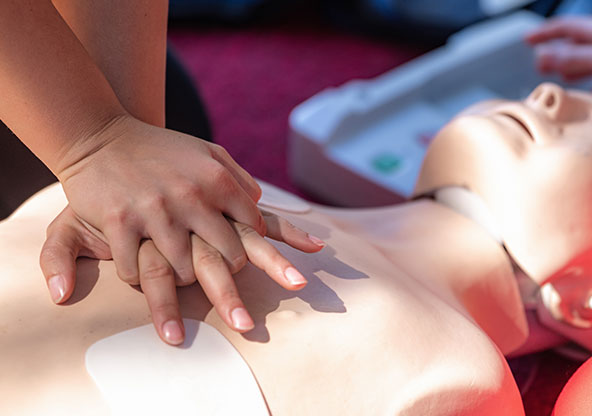Mitral Valve Repair
What is the Mitral Valve?
Heart valves open and close to move blood through the heart. Your mitral valve is a small flap that allows blood to flow from the heart’s top left chamber to the bottom left chamber. If your mitral valve hardens or loosens, your blood flow can be interrupted or move in the wrong direction, causing serious harm. During mitral valve repair, surgeons fix the damaged valve either with minimally invasive surgery or open-heart surgery. Mitral valve replacement can be performed if the valve is too damaged to repair.
When Do You Need Mitral Valve Repair?
You may consider mitral valve repair if you have:
- Infection in the valve - Bacteria can enter the bloodstream and settle into a heart valve.
- Mitral regurgitation - When the mitral valve does not close entirely, blood can leak into the left atrium.
- Mitral stenosis - When a mitral valve does not fully open, blood flow can be restricted.
- Severe mitral valve prolapse - When the two valve flaps do not close evenly, a tiny amount of blood can leak backward. People with severe mitral valve prolapse may not find relief from medicine and eventually need surgery.
If you suspect heart valve disease, visit your primary care physician for additional testing and request a referral to a heart specialist. Because you might not have any symptoms, keep up routine physical exams so your physician can look for small heart changes.
What Does a Cardiothoracic Surgeon Do?
If you have ever been diagnosed with a specific medical condition involving the heart or chest, your primary care physician may have referred you for cardiothoracic surgery.
Preparing for Mitral Valve Repair
If you undergo mitral valve repair, your physician will give you detailed instructions to prepare for surgery.
Mitral valve repair is a major surgery. Plan now for a low-stress recovery to help you focus later on what is most important; your healing.
Consider:
- Prepare a few easy meals to freeze and reheat.
- Stock plenty of healthy, no-prep snacks.
- Arrange for pet care.
- Ask for help from a friend or family member to pick up groceries, drive you around and refill your prescriptions.
You may need to stop taking medications a few weeks before surgery, including medicine that increases your risk of bleeding.
What to Expect During Surgery
Before surgery, you will receive anesthesia so you fall asleep and feel no pain. The surgeon will connect a heart-lung bypass machine to pump your heart and lungs during surgery. Mitral valve repair typically takes two to four hours.
There are a few ways surgeons perform mitral valve repair. Your heart surgeon can make several cuts in your chest to access the heart and repair the mitral valve by reshaping or rebuilding the flaps. In endoscopic surgery, your surgeon makes several tiny cuts in the chest so he or she can use cameras and specialized surgical tools to perform the procedure using minimally invasive techniques. In some cases, surgeons use a robotic system for the surgery, which allows the surgeon to operate as he or she watches a 3D image of the heart on a computer display in the operating room.
New procedures are available that allow a surgeon to insert a metal clip into the mitral valve to reduce mitral valve regurgitation. During this procedure, known as MitraClip™, a catheter is introduced through an artery in the groin. Once at the mitral valve, the surgeon can clip the valve to reduce incorrect blood flow. Ask your cardiologist if you qualify for a MitraClip™ procedure.
Recovery After Mitral Valve Repair
Most patients stay in the hospital three to five days for recovery. Nurses will watch your vital signs and slowly help you get back on your feet. You may see a physical therapist during your stay.
Expect to have some side effects after heart surgery. You may experience:
- Chest pain or swelling
- Loss of appetite
- Sleep problems
- Constipation
- Mood swings.
These go away with time.
Recovery is different for everyone. The length of your recovery is based on your individual heart problem, type of surgery, and health before surgery. You can speed up recovery by taking care of your incisions and recognizing signs of infection.
Your physician will let you know when you can return to work, driving and exercise.

